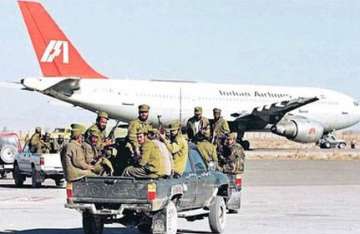With terror threats to the civil aviation sector looming large, a Group of Ministers on Tuesday cleared proposals to make the anti-hijacking law more stringent by including death sentence as a punishment. The GoM, headed by Home Minister P Chidambaram, also decided to incorporate a new clause to cover the aspect of conspiracy to hijack an aircraft which does not exist in the Anti-Hijacking Act of 1982.
The Clause 4 of the Act, which now provides for life imprisonment and a fine for hijacking, would be amended to include death penalty also, sources said. They said the proposed amendments would now be given a legal shape with the intent of bringing them before Parliament in the ensuing Budget Session for the law to be amended. In 2005, the government had unveiled a tough anti-hijack policy under which any hijacked plane, being used as a missile to target vital installations as in the 9/11 terror attack, would be shot down.
The sources said the effort now was to incorporate these stringent policy provisions in the anti-hijack law. The policy, which was cleared five years ago by the Cabinet Committee on Security, also provides that no negotiations whatsoever would be held with the hijackers on their demands.
These provisions aim at countering situations like the December 1999 hijack of Indian Airlines' IC-814 which was taken to Kandahar. Four top terrorists were freed in exchange of the passengers, one of whom was killed by the hijackers.
Besides Chidambaram, the meeting of the GoM on aviation security was attended by Law Minister Veerappa Moily, Human Resources Development Minister Kapil Sibal and Civil Aviation Minister Praful Patel. The policy provides for immobilisation of an aircraft and not allowing it to take off if the hijacking takes place on Indian soil, besides the scrambling of IAF fighters if the hijacked plane remained in the Indian airspace.
Any decision to shoot down an aircraft would be taken in extreme circumstances like the 9/11 terror attack, if the aircraft chose not to identify itself or appeared to have evil intentions of targeting vital installations, the sources said. The draft proposal was prepared by the Civil Aviation Ministry and cleared by a committee of secretaries a few months ago, they said, adding that it was then referred to the GoM for approval.
During the IC-814 hijack, the dreaded terrorists who were exchanged for 178 passengers and 11 crew members included Maulana Masood Azhar, who later floated terror outfit Jaish-e -Mohammad in Pakistan, and Ahmed Omar Saeed Sheikh, who was later held for the murder of journalist Daniel Pearl in Pakistan and allegedly played a significant role in planning the September 11 attacks. PTI
Latest India News
